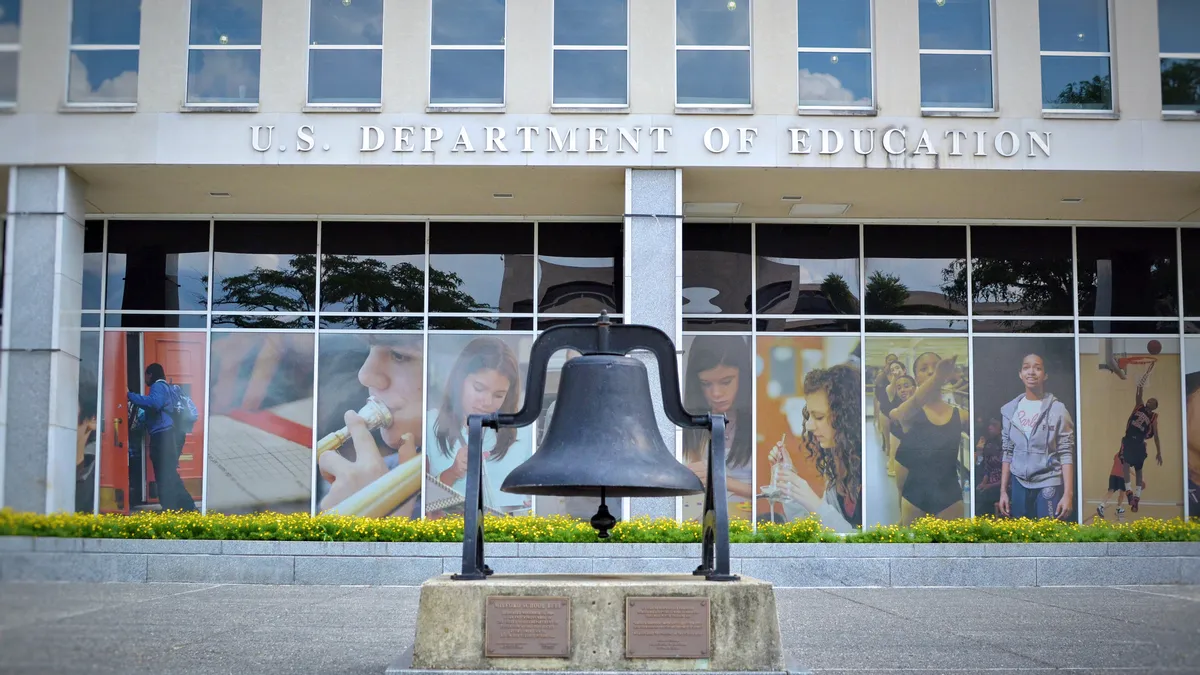Dive Brief:
- The accreditor that authorizes the University of Arizona Global Campus to participate in federal financial aid programs has potentially fallen out of compliance with U.S. Department of Education regulations due to concerns over its monitoring of the online college’s recruiting and admissions practices, according to a recent staff report from the federal agency.
- UAGC was acquired by the University of Arizona in late 2020. Under its former for-profit ownership, the online college, then named Ashford University, was dogged by complaints that it misled prospective students.
- Those accusations culminated in a 2017 lawsuit against Ashford and its former owner, a court case it ultimately lost. Although the college’s accreditor, the WASC Senior College and University Commission, has policies requiring it to investigate potential problems with recruiting and admissions, Education Department staff wrote it did not provide evidence that it increased scrutiny in these areas.
Dive Insight:
WSCUC has historically accredited four-year institutions in California, Hawaii, and U.S. territories Guam and American Samoa. Those colleges include UAGC, which University of Arizona acquired to build its online footprint and attract more adult students.
Even though the online college changed hands, it initially kept close ties to its former owner, Zovio, through a contract for educational services like marketing and recruitment. But the online college terminated its relationship with the company last year, with officials citing a desire to have more control over the institution’s operations.
The decision to cut ties with Zovio came about six months after a California judge found the company had misled students about the cost and career outcomes of Ashford’s programs. One analysis estimated Zovio made 1.2 million misleading phone calls to prospective students between March 2009 and April 2020.
“It is concerning to the Department that UAGC continued to have serious issues with its recruitment and admissions practices at least through the agency’s current review period, yet the agency did not identify these problems at the school,” Education Department staff wrote in the report.
WSCUC first accredited Ashford in 2013 and renewed the institution’s accreditation in 2019. At the time, the agency issued a formal notice of concern over low student persistence and completion rates at the institution.
The accreditor cited several university policies as evidence that UAGC was improving its recruitment and admissions practices following the lawsuit, according to the latest Education Department report. They include new staff members to oversee recruiting practices and a secret shopper program to pinpoint problems.
However, the report said the accreditor provided this evidence by quoting the college’s self-reported practices.
“It isn’t clear from the documentation provided how the agency verified the school’s statements about its current recruiting and admissions practices,” the staff wrote.
In the report, the Education Department’s staff recommended that the accreditor’s recognition be continued subject to the agency demonstrating compliance with several criteria within a year. The report also suggests that WSCUC be required to provide additional documentation of its review of UAGC’s admissions and recruiting practices.
Accreditors serve as gatekeepers to billions of dollars of federal financial aid, including student loans and Pell Grants. These agencies are supposed to watch over colleges, ensuring they aren’t engaging in deceptive practices or leaving students worse off than before they enrolled.
However, they’ve drawn criticism that they aren’t doing enough to prevent some colleges from abusing or failing students. In response, several advocacy and higher education organizations have called on the Education Department to step up its own oversight of accreditors.
WSCUC is among several accreditors that have recently applied for their federal recognition to be renewed. The National Advisory Committee on Institutional Quality and Integrity — a group that makes recommendations regarding accrediting agencies — will review WSCUC’s application at a three-day meeting starting Feb. 28 and then make its own recommendations.
“WSCUC will speak to our accomplishments, thorough and rigorous oversight of our institutions, evidence of outcomes, and areas for the agency’s further attention and improvement when we appear before NACIQI,” WSCUC President Jamienne Studley said in a statement Monday.
A top Education Department official will consider the recommendations from the agency’s own staff and NACIQI before making a decision on whether to continue WSCUC’s recognition.










